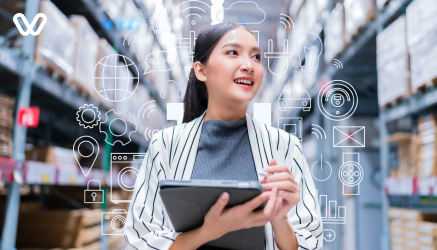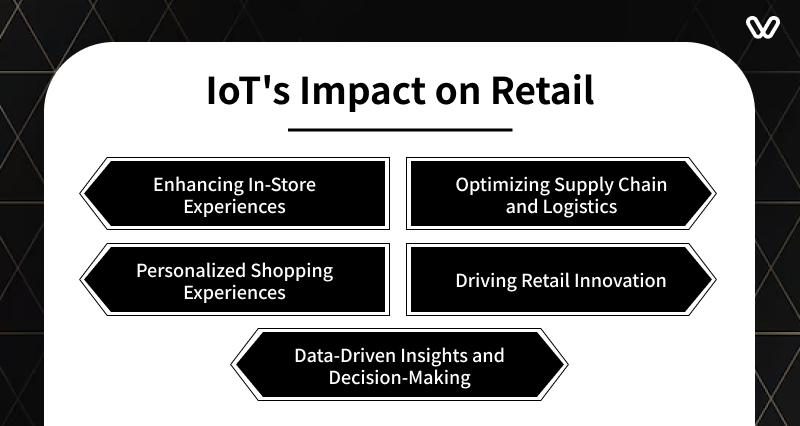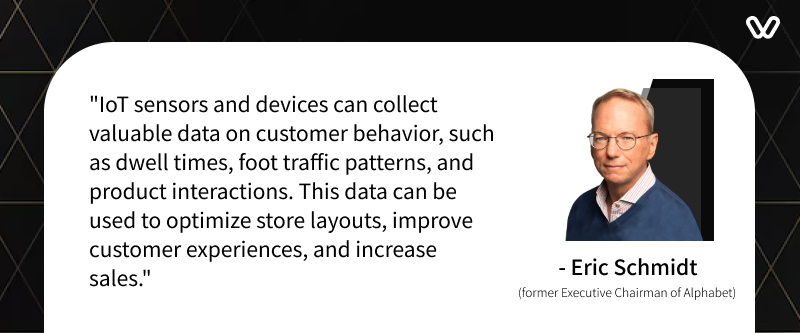In the ever-evolving world of retail, businesses are constantly seeking innovative ways to enhance customer experiences, streamline operations, and gain a competitive edge. The Internet of Things (IoT), a revolutionary technology, has taken the industry by storm, promising to reshape how we shop, sell, and interact with products. From smart shelves to personalized recommendations, IoT in Retail is revolutionizing the global retail industry with cutting-edge technology and data-driven insights.
Enhancing In-Store Experiences
Smart Shelves and Inventory Management
One of the most significant impacts of IoT in retail is the introduction of smart shelves.
These intelligent systems use sensors and RFID (Radio Frequency Identification) technology to monitor inventory levels in real-time. By tracking stock levels, retailers can optimize their supply chain, reduce stockouts, and ensure that popular items are always available.
Additionally, smart shelves can alert staff when items need to be restocked, improving operational efficiency and customer satisfaction.
Interactive Displays and Augmented Reality
IoT-enabled interactive displays and augmented reality (AR) technology are transforming the in-store shopping experience. These immersive tools allow customers to virtually try on clothes, visualize furniture in their homes, or explore product features in detail.
By providing an engaging and personalized experience, retailers can increase customer engagement, drive sales, and foster brand loyalty.
Optimizing Supply Chain and Logistics
Real-Time Tracking and Asset Management
IoT plays a crucial role in optimizing supply chain and logistics operations for retailers.
RFID tags and sensors can track the movement of goods from the warehouse to the store, providing real-time visibility into inventory levels and enabling efficient asset management. By minimizing lost items and streamlining inventory management, retailers can reduce costs and improve efficiency.
Predictive Maintenance and Energy Efficiency
IoT sensors can monitor the performance and condition of equipment and machinery used in retail operations, such as refrigeration units, lighting systems, and HVAC systems. By collecting and analyzing data from these devices, retailers can implement predictive maintenance strategies, reducing downtime and extending the lifespan of their assets.
Moreover, IoT-enabled energy management systems can optimize energy consumption, resulting in cost savings and a reduced environmental footprint.
Personalized Shopping Experiences
Beacon Technology and Location-Based Services
Beacon technology, powered by Bluetooth Low Energy (BLE), has become a game-changer in the retail industry. These small devices can detect nearby smartphones and deliver personalized notifications, promotions, and product information to customers as they move through the store.
By leveraging location-based services, retailers can offer tailored recommendations, facilitate in-store navigation, and enhance the overall shopping experience.
Customer Behavior Analytics
Internet of Things Applications like IoT sensors and devices can collect valuable data on customer behavior, such as dwell times, foot traffic patterns, and product interactions.
By analyzing this data using advanced analytics and machine learning algorithms, retailers can gain insights into consumer preferences, optimize store layouts, and make data-driven decisions to improve sales and customer satisfaction. This aligns with retail industry trends that emphasize data-driven decision-making and customer insights powered by the rise of AI and analytics.
Driving Retail Innovation
Omnichannel Integration
IoT plays a pivotal role in enabling seamless omnichannel experiences for customers.
Retailers can provide a consistent and personalized shopping journey by integrating online and offline channels. For instance, customers can browse products online, reserve them for in-store pickup, or even initiate returns through multiple touchpoints. This retail innovation empowers customers with greater convenience and flexibility, fostering brand loyalty and driving sales. It addresses retail industry trends that demand seamless omnichannel experiences.
Data-Driven Insights and Decision-Making
Centralized Data Management and Analytics
Internet of Things applications generate vast amounts of data from various sources, including sensors, devices, and customer interactions. By implementing centralized data management and analytics platforms, retailers can consolidate and analyze this data to
These insights can inform strategic decisions, such as product assortment, pricing strategies, and promotional campaigns, enabling retailers to stay ahead of market trends and customer demands. Industry forecasts predict that this data-driven approach will become even more crucial as retailers strive to compete in an increasingly digital landscape.
Predictive Analytics and Demand Forecasting
IoT-driven predictive analytics and demand forecasting models can help retailers anticipate future sales patterns and customer behavior. By leveraging historical data, demographic information, and real-time IoT insights, retailers can optimize inventory levels, plan promotions, and allocate resources more effectively, reducing waste and improving profitability.
Conclusion
As the retail landscape continues to evolve, it’s crucial for businesses to stay ahead of the curve. The convergence of IoT and AI in the retail industry is creating unprecedented opportunities for innovation and growth. At Vinove, we’re committed to helping retailers leverage the power of IoT to enhance customer experiences, optimize operations, and drive growth. With our cutting-edge IoT solutions, we can help you stay competitive and meet the evolving demands of modern consumers. Contact us today to learn how we can help you thrive in the dynamic retail landscape.


